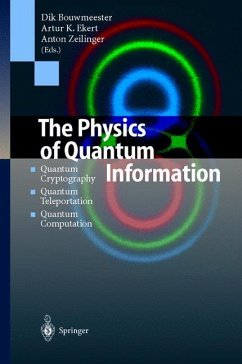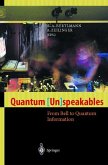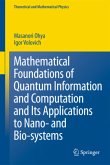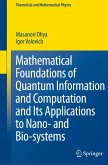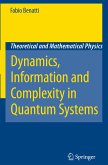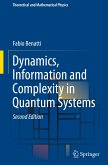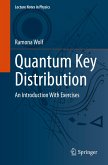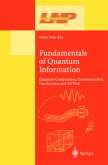Information is stored, transmitted and processed by physical means. Thus, the concept of information and computation can be formulated in the con text of a physical theory and the study of information requires ultimately experimentation. This sentence, innocuous at first glance, leads to non-trivial consequences. Following Moore's law, about every 18 months microprocessors double their speed and, it seems, the only way to make them significantly faster is to make them smaller. In the not too distant future they will reach the point where the logic gates are so small that they consist of only a few atoms each. Then quantum-mechanical effects will become important. Thus, if computers are to continue to become faster (and therefore smaller), new, quantum technology must replace or supplement what we have now. But it turns out that such technology can offer much more than smaller and faster microprocessors. Several recent theoretical results have shown that quantum effects may be harnessed to provide qualitatively new modes of communication and computation, in some cases much more powerful than their classical counterparts. This new quantum technology is being born in many laboratories. The last two decades have witnessed experiments in which single quantum particles of different kinds were controlled and manipulated with an unprecedented preci sion. Many "gedanken" experiments, so famous in the early days of quantum mechanics, have been carried out.
From the reviews
"Included among the more than 40 contributors are some of the subject¿s leading European practitioners¿ Topics are well balanced between presentations of the theory (dazzling in its ingenuity) and crude attempts at implementation (tours de force in technol9gy, but still a long way from non-trivial computational application)¿ ¿The Physics of Quantum Information¿ does convey a through and authoritative picture of the state of this fascinating futuristic art as we enter the 21st century."
- American Scientist
"This volume covers Quantum Cryptography Quantum Teleportation and Quantum Computation. The book presents clearly the fundamental concepts, amply illustrated with theoretical calculations and descriptions of experimental work. Consequently, this is a first-class primer, pitched at a level suitable for honours students or above.
The first section, dealing with Quantum Cryptography, discusses the possibility of secure exchange of key material via entangled states in quantum channels. The presentation makes it clear that quantum key exchange, using quantum indeterminacy to test for an eavesdropper, offers genuine security. The discussion of experimental realisations suggests that this will be a practical technology in the not too distant future.
The next chapter is on Quantum "teleportation", the transfer of a quantum state to an entangled system at another location. This chapter includes a discussion of a number of elegant experiments.
Much of the book is devoted to Quantum Computing. An introduction introduces the qubit (quantum bit) and quantum logic gates, followed by a very clear exposition of quantum algorithms, and their speed advantages over classical algorithms. The presentation then moves to the practicalities of building a quantum computer. Decoherence, a formidable challenge, is covered at length. There is a tendency in some writings to understate the difficulties that decoherence mightpresent, but here the discussion is clear and balanced. The authors then move to potential solutions; quantum error correction and entanglement purification. Finally, this book has a very good index and an extensive bibliography. Unreservedly recommended, and deserving of a place in any Physics library."
Andrew Davies
Department of Defence
Canberra ACT
The Physicist, Australian Institute of Physics, 2001,38,1
"The best of these (multi-author works) so far is The Physics of Quantum Information edited by Dik Bouwmeester, Artur Ekert and Anton Zeilinger and published by Springer-Verlag. It is too much to expect that a multi-author book would present a coherent vision of a subject as young as this. The editors however have done an excellent job of stitching together a rewarding tapestry of the field as it stands today. (...) The Physics of Quantum Information is essential reading for anyone new to the field, particularly if they enter from the direction of quantum optics and atomic physics." Gerard J. Milburn, Australia; Quantum Information and Computation 1, 89-90 (2001)
"The editors however have done an excellent job of stitching together a rewarding tapestry of the field as it stands today...The Physics of Quantum Information is essential reading for anyone new to the field, particularly if they enter from the direction of quantum optics and atomic physics."
-The Physicist
"Unreservedly recommended, and deserving of a place in any Physics library."
-Andrew Davies, Department of Defence, Canberra, Australia
AMERICAN SCIENTIST
"Topics are well balanced between presentations of the theory (dazzling in its ingenuity) and crude attempts at its implementation (tours de force of technology, but still a long way from any nontrivial computational application)...does convey a thorough and authoritative picture of the state of this fascinating futuristic art as we enter the 21st century."
QUANTUM INFORMATION& COMPUTATION
"...an excellent job of stitching together a rewarding tapestry of the field as it stands today...essential reading for anyone new to the field, particularly if they enter from the direction of quantum optics and atomic physics."
"Included among the more than 40 contributors are some of the subject¿s leading European practitioners¿ Topics are well balanced between presentations of the theory (dazzling in its ingenuity) and crude attempts at implementation (tours de force in technol9gy, but still a long way from non-trivial computational application)¿ ¿The Physics of Quantum Information¿ does convey a through and authoritative picture of the state of this fascinating futuristic art as we enter the 21st century."
- American Scientist
"This volume covers Quantum Cryptography Quantum Teleportation and Quantum Computation. The book presents clearly the fundamental concepts, amply illustrated with theoretical calculations and descriptions of experimental work. Consequently, this is a first-class primer, pitched at a level suitable for honours students or above.
The first section, dealing with Quantum Cryptography, discusses the possibility of secure exchange of key material via entangled states in quantum channels. The presentation makes it clear that quantum key exchange, using quantum indeterminacy to test for an eavesdropper, offers genuine security. The discussion of experimental realisations suggests that this will be a practical technology in the not too distant future.
The next chapter is on Quantum "teleportation", the transfer of a quantum state to an entangled system at another location. This chapter includes a discussion of a number of elegant experiments.
Much of the book is devoted to Quantum Computing. An introduction introduces the qubit (quantum bit) and quantum logic gates, followed by a very clear exposition of quantum algorithms, and their speed advantages over classical algorithms. The presentation then moves to the practicalities of building a quantum computer. Decoherence, a formidable challenge, is covered at length. There is a tendency in some writings to understate the difficulties that decoherence mightpresent, but here the discussion is clear and balanced. The authors then move to potential solutions; quantum error correction and entanglement purification. Finally, this book has a very good index and an extensive bibliography. Unreservedly recommended, and deserving of a place in any Physics library."
Andrew Davies
Department of Defence
Canberra ACT
The Physicist, Australian Institute of Physics, 2001,38,1
"The best of these (multi-author works) so far is The Physics of Quantum Information edited by Dik Bouwmeester, Artur Ekert and Anton Zeilinger and published by Springer-Verlag. It is too much to expect that a multi-author book would present a coherent vision of a subject as young as this. The editors however have done an excellent job of stitching together a rewarding tapestry of the field as it stands today. (...) The Physics of Quantum Information is essential reading for anyone new to the field, particularly if they enter from the direction of quantum optics and atomic physics." Gerard J. Milburn, Australia; Quantum Information and Computation 1, 89-90 (2001)
"The editors however have done an excellent job of stitching together a rewarding tapestry of the field as it stands today...The Physics of Quantum Information is essential reading for anyone new to the field, particularly if they enter from the direction of quantum optics and atomic physics."
-The Physicist
"Unreservedly recommended, and deserving of a place in any Physics library."
-Andrew Davies, Department of Defence, Canberra, Australia
AMERICAN SCIENTIST
"Topics are well balanced between presentations of the theory (dazzling in its ingenuity) and crude attempts at its implementation (tours de force of technology, but still a long way from any nontrivial computational application)...does convey a thorough and authoritative picture of the state of this fascinating futuristic art as we enter the 21st century."
QUANTUM INFORMATION& COMPUTATION
"...an excellent job of stitching together a rewarding tapestry of the field as it stands today...essential reading for anyone new to the field, particularly if they enter from the direction of quantum optics and atomic physics."

